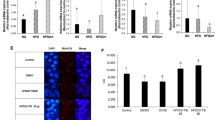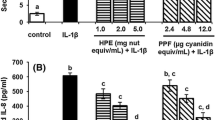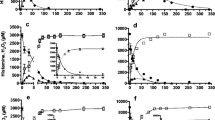Abstract
Chronic gut inflammation is associated with radical oxygen species (ROS) genesis. ROS may activate certain transcription factors such as nuclear factor κ beta (NF-κB), which regulates cyclooxygenase-2 (COX-2). Diquat, a food contaminant, is responsible for oxidative stress. This work aimed to establish the involvement of ROS and prostanoids on diquat-induced gastrointestinal inflammation and mast cell hyperplasia. Diquat increased gastrointestinal MPO activity and mast cell number. Its effect on gastric MPO activity was reversed by PD 138,387 (a COX-2 selective inhibitor) and PDTC (an inhibitor of NF-κB activation) but not by DMSO (a hydroxyl radical scavenger) and allopurinol (a xanthine oxidase inhibitor). In contrast, increased jejunal MPO activity was blocked by both DMSO, PD 138,387, and PDTC, while allopurinol enhanced it. PD 138,387 and PDTC reduced gastrointestinal mast cell number while DMSO and allopurinol did not Diquat-induced inflammation involves a gastrointestinal NF-κB activation and COX-2 dependent proinflammatory prostanoid synthesis. Furthermore, the hydroxyl radical is involved in intestinal but not gastric inflammation.
Similar content being viewed by others
REFERENCES
Nakajima S, Krishnan B, Ota H, Segura M, Hattori T, Graham D, Genta M: Mast cell involvement in gastritis with or without Helicobacter pylori infection. Gastroenterology 113:746–754, 1997
Geboes K, Ecors N: The infectious track in inflammatory bowel disease: a controversial area. Res Clin Forums 00:41–48, 1995
Satsangi J, Jewellin DP, Rosenberg WMC, Bell JI: Genetics of inflammatory bowel disease. Gut 35:696–700, 1994
Bing XIA, Crosuis JBA. Meuwissen SGM, Pena AS: Inflammatory bowel disease: Definition, epidemiology, etiologic aspects, and immunogenetic studies. World J Gastroenterol 4:446–458, 1998
Anton PM, Theodorou V, Bertrand V, Eutamene H, Aussenac T, Feyt N, Fioramonti J, Bueno L: Chronic ingestion of a potential food contaminant induces gastrointestinal inflammation in rats: Role of nitric oxide and mast cells. Dig Dis Sci 45:1842–1849, 2000
Crabtree HC, Lock EA, Rose MS: Effects of diquat on the gastrointestinal tract of rats. Toxicol Appl Pharmacol 41:585–595, 1977
Thomas CE, Aust SD: Reductive release of iron from ferritin by cation free radicals of paraquat and other bipyridils. J Biol Chem 265:13064–13070, 1986
Farrington JA, Ebert M, Land EJ, Fletcher K: Bipyridilum quaternary salts and related compounds. V. Pulse radiolysis studies of the reaction of paraquat radical with oxygen. Implication for the mode of action of bipyridil herbicides. Biochem Biophys Acta 314:372–381, 1973
Bus JS, Cagen SZ, Olgaard M, Gibson JE: A mechanism of paraquat toxicity in mice and rats. Toxicol Appl Pharmacol 35:501–513, 1976
McCord JM: Free radicals and inflammation: Protection of synovial fluid by superoxide dismutase. Science 185:529–531, 1974
Grisham MB: Oxidants and free radicals in inflammatory bowel disease. Lancet. 344:859–861, 1994
Jourd'heuil D, Morise Z, Conner EM, Kurose I, Grisham MB: Oxidant-regulation of gene expression in the chronically inflamed intestine. Keio J Med 46:10–15, 1997
Grisham MB, Granger DN: Neutrophil-mediated mucosal injury. Role of reactive oxygen metabolites. Dig Dis Sci 33:6S–15S, 1988
Baeurle PA, Henkel T: Function and activation of NK-?B in the immune system. Annu Rev Immunol 12:141–179, 1994
May MJ, Ghosh S: Signal transduction through NF-?B. Immunol Today 19:80–88, 1998
Arai I, Hamasaka Y, Futaki S, Takahashi S, Yoshikawa K, Higuchi S, Otomo S: Effect of NS-398, a new nonsteroidal antiinflammatory agant, on gastric ulceration and acid secretion in rats. Res Commun Chem Pathol Pharmacol 81:259–270, 1993
Chan CC, Boyce S, Brideau C, Ford-Hutchinson AW, Gordon R, Guay D, Hill RG, Li CS, Mancini J, Penneton M, Prasit P, Rasori R, Riendeau D, Roy P, Tagari P, Vickers P, Wong E, Rodger IW: Pharmacology of a selective cyclooxygenase-2 inhibitor L-245,337: A novel nonsteroidal antiinflammatory agent with an ulcerogenic sparing effect in rat and nonhuman primate stomach. J Pharmacol Exp Ther 274:1531–1537, 1995
Lesch CA, Gilbertsen RB, Song Y, Dyer RD, Schrier D, Kraus ER, Sanchez B, Guglietta A: Effects of novel anti-inflammatory compounds on healing of acetic acid-induced gastric ulcer in rats. J Pharmacol Exp Ther 287:301–306, 1998
Bradley PP, Priebat DA, Christensen RD, Rothstein G: Measurement of cutaneous inflammation: Estimation of neutrophil content with an enzyme marker. J Invest Dermatol 78:206–209, 1982
Robberts ISD, Jones CJP, Stoddart RW: Lectin histochemistry of the mast cell: heterogeneity of rodent and human mast cell population. Histochem J 22:73–80, 1990
Parks DA, Granger DN: Ischemia-induced vascular changes: role of xanthine oxidase and hydroxyl radicals. Am J Physiol 245:G285–G289, 1983
Onyeama HP, Oehme FW: A litterature review of paraquat toxicity. Vet Hum Toxicol 26:494–502, 1984
Drake IM, Mapstone NP, Schorah CJ, White KLM, Chalmers, DM, Dixon MF, Axon ATR: Reactive oxygen species activity and lipid peroxidation in Helicobacter pylori associated gastritis: Relation to gastric mucosal ascorbic acid concentrations and effect of H. pylori eradication. Gut 42:768–771, 1998.
Keshavarzian A, Sedghi S, Kanofsky J, List T, Robinson C, Ibrahim C, Winship D: Excessive production of reactive oxygen metabolites by inflamed colon: Analysis by chemiluminescence probe. Gastroenterology 103:177–185, 1992
Salvemini D, Wang ZQ, Stern MK, Currie MG, Misko TP: Peroxynitrite decomposition catalysts: Therapeutics for peroxynitrite-mediated pathology. Proc Natl Acad Sci USA 95:2659–2663, 1998
Qu XW, Rozenfeld RA, Huang W, Bulkley GB, Hsueh W: The role of xanthine oxidase in platelet activating factor induced intestinal injury in the rat. Gut 44:203–211, 1999
Perry MA, Wadhwa S, Parks DA, Pickard W, Granger DN: Role of oxygen radicals in ischemia-induced lesions in the cat stomach. Gastroenterology 90:362–367, 1986
Radi R, Beckman JS, Bush KM, Freeman BA: Peroxinitriteinduced membrane lipid peroxidation: The cytotoxic potential of superoxide and nitric oxide. Arch Biochem Biophys 288:481–487, 1991
Naito Y, Yoshikawa T, Matsuyama K, Nishimura S, Yagi N, Kondo M: Effects of free radical scavengers on indomethacininduced aggravation of gastric ulcer in rats. Dig Dis Sci 40:2019–2021, 1995
Moyana T, Lalonde JM: Carrageenan-induced intestinal injury: possible role of oxygen free radicals. Ann Clin Lab Sci 21:258–263, 1991
Sandhu IS, Grisham MB: Modulation of neutrophil function as a mode of therapy for gastrointestinal inflammation. In Immunopharmacology of the Gastrointestinal Tract. JL Wallace (ed). Toronto, Academic Press, 1993, pp 51–68
Granger DN, McCord JM, Parks DA: Xanthine oxidase inhibitors attenuate ischemia-induced vascular parmeability changes in the cat intestine. Gastroenterology 90:80–84, 1986
Denburg JA: Basophil and mast cell lineage in vitro and in vivo. Blood 79:846–860, 1992
Heller A, koch T, Schmeck J, van Ackern K: Lipid mediators in inflammatory disorders. Drugs 56:487–496, 1999
Simmons DL, Xie W, Chipman JG, Evett GE: Multiple cyclooxygenases: Cloning of a mitogen-inducible form. In Pros-taglandins, Leukotrienes, Lipoxins and PAF. JM Bailey (ed). New York, Plenum Press, 1991, pp 67–78
Smith WL: Prostanoid biosynthesis and mechanisms of action. Am J Physiol 263:F181–F191, 1992
D'Aquisto F, Ialenti A, Iuvone T, Di Rosa, M, Carnuccio R: Inhibition of nuclear factor-?B prevents the loss of vascular tone in lipopolysaccharide-treated rats. Eur J Pharmacol 363:253–257, 1999
Rogler G, Brand K, Vogl D, Page S, Hofmeister R, Andus T, Knuechel R., Baeurle PA, Sholmerich J, Gross V: Nuclear factor ?B is activated in macrophages and epithelial cells of inflamed intestinal mucosa. Gastroenterology 115:357–369, 1998
Schreiber S, Nikolaus S, Hampe J: Activation of nuclear factor ?B in inflammatory bowel disease. Gut 42:477–484, 1998
Morrow JD, Hill KE, Burk RF, Nanmour TM, Badr KF: A series of prostaglandin F2-like compounds are produced in vivo in humans by a non-cyclooxygenase, free radical catalyzed mechanism. Proc Natl Acad Sci USA 87:9383–9387, 1990
Barrera S, Lai J, Fiocchi C, Roche JK: 1996. Regulation by prostaglandin E2 of intereukin release by T lymphocytes in mucosa. J Cell Physiol 166:130–137, 1996
Author information
Authors and Affiliations
Rights and permissions
About this article
Cite this article
Anton, P.M., Theodorou, V., Roy, S. et al. Pathways Involved in Mild Gastrointestinal Inflammation Induced by a Low Level Exposure to a Food Contaminant. Dig Dis Sci 47, 1308–1315 (2002). https://doi.org/10.1023/A:1015322514547
Issue Date:
DOI: https://doi.org/10.1023/A:1015322514547




